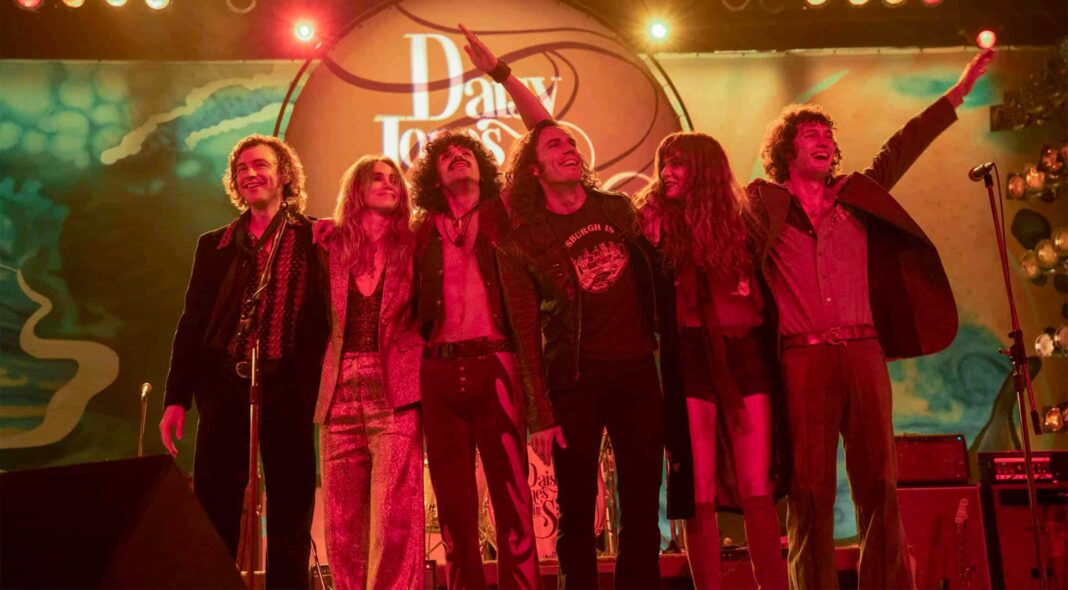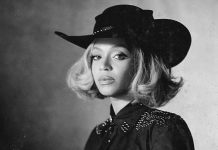(Contains spoilers)
If you have been a BookTok girlie in the last four years, chances are that Daisy Jones & The Six has lurked high on your timeline, or even your own ‘TBR’ list.
Released in 2018 and almost immediately snapped up for TV adaptation by Reese Witherspoon, the book was an instant summer hit, telling a vivid tale of a LA rock band in the 1970s. Told through interview transcripts, readers are invited into their Laurel Canyon fantasy, a messy world of friendship and fallouts, songwriting and sobriety, and the pressures of keeping everything together under the tempestuous gaze of fame.
If it sounds familiar, that’s because it is; author Taylor Jenkins Read has been upfront about how inspired she was by the origin story of Fleetwood Mac, but also the desire to centre more of a women’s experience of 1970s musical culture. In light of movements such as MeToo and BlackLivesMatter, Daisy Jones is by no means a political novel, but does gently open up conversations on race and gender relations, all the while appealing to music-loving fans who see the romance in a life spent on the road.
Pitched somewhere between a mockumentary and a fictional oral history, the public (including myself) are only three episodes into Daisy Jones’ TV adaption, with seven more episodes to come. Where telly critics have seen the whole thing, reviews are relatively disappointing; oscillating between shrugs and out-and-out trashing, pondering the difficulties of translating fictional music to screen in a compelling way. And yet, Daisy Jones’ soundtrack album, ‘Aurora’ (named for the fictional band’s breakthrough record) is sitting pretty in its bell bottoms at the top of the Apple Music charts, and fans worldwide are eulogising it online, losing themselves in the heady fantasy of 70s rock and roll. How can something be so critically panned and commercially lauded all at the same time?
First of all, you can’t have the six without Daisy Jones. Played onscreen by Riley Keough, she is admirably feisty in her determination to make it on her own uncompromising terms. In her words, “I’m not the muse, I’m the somebody”. But she also delivers a performance just passive enough for stans to project any and all of their fantasies onto her, using her fight as encouragement for their own. She’s a bit Florence Welch, a bit Stevie Knicks, and a whole lot of Elvis’s granddaughter (in genuine real life), with a couple of easter eggs knocking around to blur the line between fiction and reality.
Jones’s leading man is Billy Dunne, played by Sam Claflin. Initially reluctant to collaborate with Jones, the pair find their alchemic magic in the studio for a session of the delightfully schmaltzy ‘Look At Us Now (Honeycomb)’, trading lines about addiction and relationship issues that double up as a kind of foreshadowing for the looming heartache that shows up later in the story. Dunne’s script is positively bursting with rock’n’roll cliche (“Small venues mean we gotta play bigger!”), but the will-they-won’t-they between him and Daisy is the pivotal tension of the story, complicated by the presence of Camilla, Billy’s stoic and patient wife. Already sparking TikTok’s that match up the characters’ forbidden trysts with Taylor Swift songs, the tightrope connection between Daisy and Billy seemingly speaks to younger viewers, reading it as both tragic and strangely aspirational. When you’re a young viewer raised on songs of unrequited or difficult love, is there anything more romantic?
Of course, when you’re trying to sell a love story wrapped up in a rockumentary, it doesn’t hurt that everyone and everything is gorgeous. From Suki Waterhouse (who plays keyboardist Karen) to Camilla Morrone as Camila Dunne and Nabiyah Be as Simone Jackson, the casting is visually perfect, with a clear fashion vision for fans to latch onto. With a rumoured no-expense-spared budget that at one point shut down LA’s sunset strip, the whole show is aesthetically beautiful, bringing that 70s era to life. For fans many decades too young to actually live through it, there is something intoxicating about being able to delve into that world, to stand at those gigs and see those venues, dressed up like an opulent extended music video.
The major plotlines of Daisy Jones might be pretty predictable, but there is something comforting in their familiarity, playing out exactly as you might expect. Taking faithful cues from the original book dialogue, some of the one-liners are almost apocalyptically naff; see the supposedly-damning lyric in ‘Regret Me’, where Jones finally rejects Dunne; “When you think of me, I hope it ruins rock’n’roll.” Despite a veritable indie feast of co-writers (Phoebe Bridgers, Marcus Mumford, Cass McCombs, Ethan Gruska and more), the majority of the songs are pretty forgettable, a streaming-era retro ‘vibe’ to play in the background rather than anything truly as seminal as the plotline makes out.
And yet, in the first three episodes at least, there is something easily-bingeable in how producers tastefully aim for pleasantry, especially in a post-Euphoria world. Daisy Jones’ world is unmistakeably the gritty 70s, but the ugliest bits are relatively smoothed off. When Billy goes to rehab, we don’t see the spit and sinew of making it clean, or Camilla in the throws of childbirth. We get only flickers of Daisy’s difficult childhood, but plenty of shots of her mooning over her diary, pondering the unique combinations of words that might turn into a great all-American song. The emphasis is always, always on the positive idea of making it against the odds, of the friends that were made along the way to becoming the biggest rock’n’roll band in the world.
Speaking to our seemingly insatiable appetite for nostalgia, it’s hard not to get suckered into this kind of sweetness. Is Daisy Jones a cheesy story about a love of music seeing you through it all? Absolutely. But if you wade through the fondue, it does offer some interesting perspective. An emphasis on female solidarity is a particularly nice thing to see onscreen, especially in an era where nuanced representation of women was hard to come by. Rather than fight over a man, Camilla and Daisy share an interesting relationship of their own, while producers seem to have made the smart move of giving the character of Simone more airtime than she had in the book, allowing them to delve a little deeper into the intersections of race, homophobia and sexism. In placing women and women-made music so centrally, it’s been great seeing younger fans use Daisy Jones & The Six as an entry point for discovering the 70s through fresh eyes, building playlists and rewriting a story where female musicians were properly appreciated in their prime.
Perhaps it is the open-ended possibilities of fiction that truly makes Daisy Jones sing as a stannable entity. There’s no shortage of genuine rock documentaries out there, but the joy of a fantasy band is that you can always ask ‘what if’. Like Stillwater from Almost Famous, Pink Slip from Freaky Friday or Sex Bob-Omb from Scott Pilgrim Vs. The World, there is a thrill to wanting more from something that you’ve only been given certain snippets of. In Daisy Jones’s case, the TV adaptation has been fated for so long that the fandom has had time to luxuriate in excitable anticipation, speculating on casting or how the songs would sound off the written page. In making fan art and fake tour posters, chatting online about how certain lines will translate or performances will go, a show like this gains a glitter of fantasy and imagination, uniting young readers and listeners in an excitable new world of their own partial creation.
In some respects, fans might not have to wait much longer to see their dreams come true. On press tours for the show, members of the Six band have hinted at the fun possibility of going on a real tour, complementing the release of ‘Aurora’. For fans who love this style of music but reject the idea of listening to what their parents enjoy (like the original Fleetwood Mac), this feels like a promising opportunity to discover a whole era on their own terms. And isn’t that really what music is all about, having a band that feels like your own? Daisy Jones might not be reinventing the wheel, but in the name of booktokkers and retro-loving teens worldwide, I say it’s well worth letting them have their fun.
READ MORE: What’s behind music’s 70s revival







